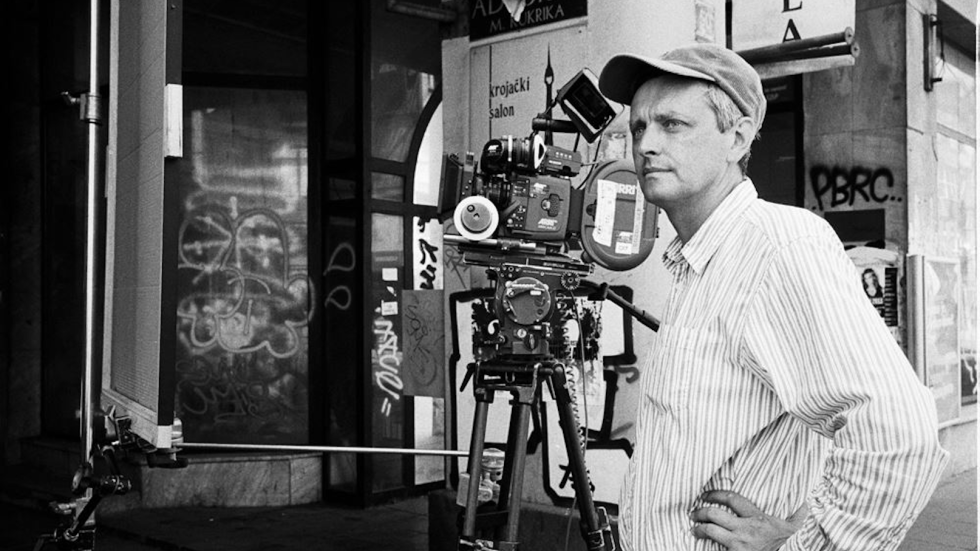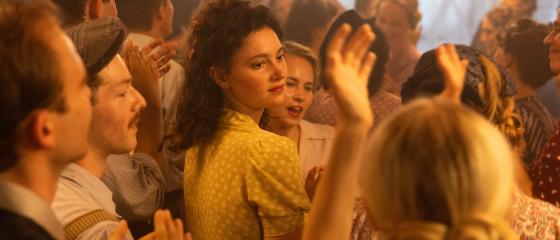Between art and science, between fiction and reality, between Ukraine and the former USSR, the life and professional career of the Ukrainian director Sergei Loznitsa (Baranovichi, 1964) is far from conventional. After studying Applied Mathematics, he worked as a scientist at the Institute of Cybernetics in Kiev. A large number of his films have looked at the traumas, the derivatives, of the inhabitants of the USSR, and its political rather than structural changes. The documentary, and its multiple forms, has been his regular tool since 1996. Since 2012, with ‘My Joy’, he has alternated reality and fiction. Dozens of international awards (including the FIPRESCI at Cannes 2012 with 'In the Fog' and the New Waves – Non Fiction at Seville in 2015 with 'The Event') endorse a prolific body of work. In this #15FestivalSevilla we will see three films by Loznitsa: 'Donbass' and the documentaries 'Victory Day' and 'The Trial'. We summarise his way of seeing the profession in 15 reflections by the filmmaker taken from various interviews.
1) The relationship between documentary and fiction
"Every time I make a fiction film I want to get as close as possible to the limit, to the border, between fiction and documentary. On the other hand, when I film documentaries, I go the other way, I get close to fiction. I believe that one influences the other, and vice versa. My intention is to continue in both genres".
2) The retrospective documentary
"I consider that it is my duty to look back and, therefore, towards the future. I studied feature film production at V.G.I.K., the national film school in Moscow. When I graduated in 1996, the circumstances were such that I could make independent, low budget documentaries. I travelled extensively through Russia, making films like that. A beautiful experience, and the stories and the encounters I had are unforgettable. In each one of my documentaries, the point isn’t to show the image that flows beyond the camera, it’s the concept, the intellectual ideas that I want to formulate”.
3) Manipulation and the point of view in the documentary
"It’s complicated to think the extent to which what is shown in a documentary is, indeed, documentary. On the one hand, each separate shot reflects what it contains, what exists. But when we start to edit, we start to change the meaning of that shot. It isn’t the same to put it at the beginning or at the end. In each of those places, the same shot has a different meaning. We can, in turn, unite two different shots: from their union we obtain a third meaning. When we construct a film, in one way or another we obtain an illusion that doesn’t reflect the same reality of each separate shot. It doesn’t matter if you film it as cinéma vérité. What we obtain at the end isn’t a documentary, it’s just our imagination with regard to that image we saw at some time. All the ethical questions move to a different level. Ethics is a question of relationships between people and what we have in cinema is a relationship between shadows. The link between one question and the other is more profound and complicated that we can imagine".
4) Form is the motor
"Without the formal element there is no film. In any case, I always try to fight against the form, destroy it slowly: form is the opposite of chaos, form is a means for knowledge and for embedding each work. The idea isn’t embedded anywhere, it doesn’t exist, whether in architecture, painting, philosophy or literature, or in a multiplication table. If we talk about my attitude to form, it is certainly very contradictory: on the one hand there is the aspiration to give form, and, on the other, the aspiration to absolute freedom, to the chaotization of everything. It is at the limit of these contradictory movements that a film is born".
5) Influences
"We don’t always know what influences us. There is a certain inertia in the perception of the world and very often we don’t understand the significance of an event until a lot of time has passed. So we can’t always evaluate what influences us, but obviously there are directors and films that left their mark on my formation: Buñuel, Bresson, Hitchcock, Wiene, Murnau, Dreyer... There are films that one must see in one’s life, the rest are projections, reflections ".
6) Russia yesterday
"One should know the history and tradition of the Russian State. After the Revolution, in the years after 1917, there was such bloodshed in the social framework that we are still feeling the effects today. They killed the royal family, the aristocracy and the military elite. They killed, exterminated and exiled all the intellectual class, writers, teachers, philosophers. They exterminated the clergy. There was famine after the restructuring of the agricultural sector and its collectivization. Another forced change. The Second World War also brought with it the great destruction of rural towns from which the countryside never recovered. After the war, there was another famine that killed 10 million people. If we take a retrospective look at the history of Russia, it’s tragic”.
7) Russia today
"I’ve lived in a country with an unpredictable past and, even now, Russia is very unpredictable. In contemporary Russia, Stalin is again becoming a great national hero. If we are still debating whether Stalin was a good administrator of the country, it means that someone didn’t do their job well. I’m talking about historians, filmmakers, writers and politicians. There are so many crimes in the past that were never tried... We still need our own Nuremberg trials. The KGB and the secret services tortured and killed millions of innocent people, but those institutions have never been brought to trial".
8) Learning from the past
"Russian history is a cut and paste. It repeats itself infinitely. Hell doesn’t appear when horrible things happen, but when those things happen time and again. It’s very hard to change the mentality of a whole nation. The big question is how to educate people who don’t want to be educated".
9) Culture in Russia
"It’s a very serious problem. Culture can be extinguished, it can die. For any strategy to work, it needs time, and we don’t have that, because of the speed of disintegration, which is getting faster. I get the impression that those who have the capacity to think are no longer among us. The audience in the 1980s used to be critical. Today it isn’t possible. The mentality has been transformed. Professionals at a higher level have been brainwashed. They’re asleep and don’t see things as they are. And the only thing that can save society is education. It’s necessary, because it can give people an understanding of what is happening, without it... it’s like driving a car with your eyes closed. I fear that people are being slowly infantilised, and they won’t be ready to assume responsibilities. And if we maintain the same “democratic” elections, it’s easy for an idiot to become a president”.
10) Political cinema
"It’s impossible to make apolitical films. The tide always carries you to one of the possible shores. Many films tell us important things even if it doesn’t seem so. ‘One Flew over the Cuckoo’s Nest’, for example, is a work of art but it’s also a political statement. Or ‘Psycho’, which doesn’t seem like a political statement, but, in fact, Hitchcock talks about the principle of justice, and that is political”.
11) The danger of the filmmaker’s ideology
"No, filmmakers aren’t dangerous because of their ideology. It’s people who don’t think who are dangerous. Yes, there are people who produce propaganda, of course. And no one accepts responsibility for that propaganda: not the person who pays for it, nor the the one who makes it, nor the one who consumes it. But they are all responsible: some for making it, others for accepting it and opening up to the possibility of being deceived".
12) Art. vs. truth
"To come into contact with this art, you have to be active, get close to it. There must be a desire to learn and understand. Art is more honest, it creates a special language through which it recreates the meanings of the things you can see in the world. News reports or bad documentaries always propose simply observing. For me, that doesn’t work. When you see a film, you should follow some conventional rules, but also learn to interpret the film’s language. If you don’t interpret the language it uses and you only receive the image, that is extremely dangerous. Especially when the directors are educated and the spectators aren’t. You need to read the image to protect yourself ".
13) The effect on the spectator
"I wouldn’t say that the aim of my films is to provoke anything in the spectator, that isn’t the word I’d use, as it has negative connotations. Rather I want my films to urge the spectators to advance towards self-knowledge, self-knowledge and the awareness of certain important things that they had never considered before. That is of the greatest importance for me".
14) Mathematics and cinema.
"Until now, I haven’t found similarities between science and cinema. The schema is slightly different. Obviously it depends on science. In general, in cinema, the degree of freedom is much greater. When you start to work on a new film, it’s like working from zero on a scientific theory. It depends on you, on how far you’ll push in the creation process. It’s like a chess game with an opponent who uses as chess pieces the meanings that you yourself have generated. So when we make a film, of course, we use the clichés of perception that exist. You must kill those clichés and find new means of expression. But everything always starts from the beginning. If you’re successful, you’ll never be in a cul de sac. Cinema is a theorem that has to arrive at a final point".
15) Cinema on TV, cinema on Internet
"Seeing cinema on television is like listening to opera on the radio, of course you lose a lot of nuances, but something is left. Or like seeing the Mona List printed on a nylon bag. It’s a repairable wrong, because screens are getting bigger and resolution is better. And a format has been created that surpasses film format, our eye doesn’t distinguish it, but it’s a matter of time: every technological explosion seems to the population like a regression and then it goes on to another level: of course I’m more a fanatic of the film format. In that sense, I’m a retrograde. As for Internet, it means the end of an era for television and for cinema. But, thanks to Internet, and above and beyond the handling of authors’ rights, all the information accumulated by humanity, including art, should be accessible to everyone. How many wonderful old films are archived or forgotten, and can be recovered thanks to Internet...".







